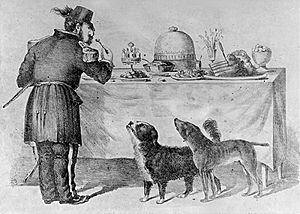Carnism

|
|
| Description | Psychological theory about the ideology of animal use |
|---|---|
| Term coined by | Melanie Joy, 2001 |
| Related ideas | Anthrozoology, ethics of eating meat, psychology of eating meat, speciesism, veganism, vegetarianism |
Carnism is a concept used in discussions of humanity's relation to animals, defined as a prevailing ideology that conditions people to support the use and consumption of animal products, especially meat. Carnism is presented as a dominant belief system supported by a variety of defense mechanisms and mostly unchallenged assumptions. The term carnism was coined by social psychologist Melanie Joy in 2001 and popularized by her book Why We Love Dogs, Eat Pigs, and Wear Cows (2009).
Central to the ideology, according to the theory, is the acceptance of meat-eating as "natural", "normal", "necessary", and (sometimes) "nice". An important feature of carnism is the classification of only particular species of animal as food, and the acceptance of practices toward those animals that would be rejected as unacceptable cruelty if applied to other species. This classification is culturally relative, so that, for example, dogs are eaten by some people in Korea but may be pets in the West, while cows are eaten in the West but protected in much of India.
Analyzing the history of vegetarianism and opposition to it from ancient Greece to the present day, literary scholar Renan Larue found certain commonalities in what he described as carnist arguments. According to him, carnists typically held that vegetarianism is a ludicrous idea unworthy of attention, that mankind is invested with dominion over animals by divine authority, and that abstaining from violence against animals would pose a threat to humans. He found that the views that farmed animals do not suffer, and that slaughter is preferable to death by disease or predation, gained currency in the nineteenth century, but that the former had precedent in the writings of Porphyry, a vegetarian who advocated the humane production of animal products which do not require animals to be slaughtered, such as wool.
In the 1970s traditional views on the moral standing of animals were challenged by animal rights advocates, including psychologist Richard Ryder, who in 1971 introduced the notion of speciesism. This is defined as the assignment of value and rights to individuals solely on the basis of their species membership. In 2001 psychologist and animal rights advocate Melanie Joy coined the term carnism for a form of speciesism that she argues underpins using animals for food, and particularly killing them for meat. Joy compares carnism to patriarchy, arguing that both are dominant normative ideologies that go unrecognized because of their ubiquity:
...
Wikipedia
